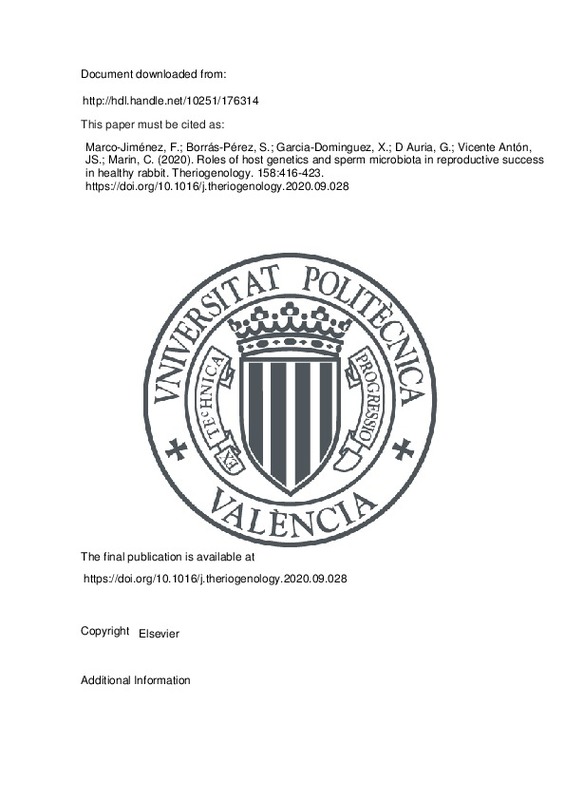JavaScript is disabled for your browser. Some features of this site may not work without it.
Buscar en RiuNet
Listar
Mi cuenta
Estadísticas
Ayuda RiuNet
Admin. UPV
Roles of host genetics and sperm microbiota in reproductive success in healthy rabbit
Mostrar el registro sencillo del ítem
Ficheros en el ítem
| dc.contributor.author | Marco-Jiménez, Francisco
|
es_ES |
| dc.contributor.author | Borrás-Pérez, Sara
|
es_ES |
| dc.contributor.author | Garcia-Dominguez, X
|
es_ES |
| dc.contributor.author | D Auria, Giuseppe
|
es_ES |
| dc.contributor.author | Vicente Antón, José Salvador
|
es_ES |
| dc.contributor.author | Marin, Clara
|
es_ES |
| dc.date.accessioned | 2021-11-05T14:08:05Z | |
| dc.date.available | 2021-11-05T14:08:05Z | |
| dc.date.issued | 2020-12 | es_ES |
| dc.identifier.issn | 0093-691X | es_ES |
| dc.identifier.uri | http://hdl.handle.net/10251/176314 | |
| dc.description.abstract | [EN] Although the effects of sperm microbiota and sperm quality have been described previously, recent studies provide evidence that female genital modifications triggered by seminal components could be of significant importance to identify some disturbances associated with fertility. So, sperm microbiota could play a key role in sperm quality, contributing to fertilisation. To understand how sperm microbiota diversity is influenced by the host genetics, the symbiotic bacteria in four inbred lines raised in the same animal facility and their effects on sperm quality and fertility were analysed. Forty healthy rabbits from four selected Spanish commercial lines were used in this research (three based on litter performance, designated A, V and LP, and one selected for daily body weight gain, called R). Significant variations in the seminal concentration, morphology and some motion parameters were found among inbred lines, but sperm motility and viability were similar among inbred lines. After mating, inbred lines selected for litter size had the same fertility rate, significantly higher than inbred line selected for body weight (82 ± 3.3%, 79 ± 3.5% and 89 ± 4.5% versus 61 ± 3.7%, for the A, V and LP vs R lines, respectively, p < 0.05). Bacteria belonging to Proteobacteria, Firmicutes, Fusobacteria and Bacteroidetes were identified in sperm microbiota. At genus level, the bacterial community composition in the sperm microbiota was influenced by host genetics. A total of 35, 16, 34, and 51 genera were accurately detected in the A, V, LP, and R lines, respectively. Moreover, Enhydrobacter, Ferruginibacter, Myroides Paracoccus, Rheinheimera, Tepidiphilus, Tetradesmus obliquus and Thauera genera were present only in the inbred lines selected for litter size. Moreover, the discriminant analysis revealed Lysinibacillus and Flavobacterium genera as potential biomarkers for fertility. Thus, these two genera may play a key role in fertility. Our results demonstrated the existence of a rabbit inbred line-specific variation in bacterial occurrence in sperm microbiota. Moreover, fertility differentials among inbred lines that were not predicted by routine semen analysis could be partly explained by the symbiotic state of the semen microbiota. | es_ES |
| dc.description.sponsorship | Funding from the Ministry of Economy, Industry and Competitiveness (Research project: AGL2017-85162-C2-1-R) is acknowledged. X.G.D. was supported by a research grant from the Ministry of Economy, Industry and Competitiveness (BES-2015-072429). English text version was revised by N. Macowan English Language Service. | es_ES |
| dc.language | Inglés | es_ES |
| dc.publisher | Elsevier | es_ES |
| dc.relation.ispartof | Theriogenology | es_ES |
| dc.rights | Reconocimiento - No comercial - Sin obra derivada (by-nc-nd) | es_ES |
| dc.subject | Microbiota | es_ES |
| dc.subject | 16S rRNA | es_ES |
| dc.subject | Semen | es_ES |
| dc.subject | Fertility | es_ES |
| dc.subject | Inbred line | es_ES |
| dc.subject.classification | BIOLOGIA ANIMAL | es_ES |
| dc.subject.classification | PRODUCCION ANIMAL | es_ES |
| dc.title | Roles of host genetics and sperm microbiota in reproductive success in healthy rabbit | es_ES |
| dc.type | Artículo | es_ES |
| dc.identifier.doi | 10.1016/j.theriogenology.2020.09.028 | es_ES |
| dc.relation.projectID | info:eu-repo/grantAgreement/AEI/Plan Estatal de Investigación Científica y Técnica y de Innovación 2013-2016/AGL2017-85162-C2-1-R/ES/MEJORA GENETICA DEL CONEJO DE CARNE: ESTRATEGIAS PARA INCREMENTAR LA EFICACIA DE LA MEJORA, REPRODUCCION Y SALUD DE LINEAS PATERNALES/ | es_ES |
| dc.rights.accessRights | Abierto | es_ES |
| dc.contributor.affiliation | Universitat Politècnica de València. Departamento de Ciencia Animal - Departament de Ciència Animal | es_ES |
| dc.contributor.affiliation | Universitat Politècnica de València. Escuela Técnica Superior de Ingeniería Agronómica y del Medio Natural - Escola Tècnica Superior d'Enginyeria Agronòmica i del Medi Natural | es_ES |
| dc.description.bibliographicCitation | Marco-Jiménez, F.; Borrás-Pérez, S.; Garcia-Dominguez, X.; D Auria, G.; Vicente Antón, JS.; Marin, C. (2020). Roles of host genetics and sperm microbiota in reproductive success in healthy rabbit. Theriogenology. 158:416-423. https://doi.org/10.1016/j.theriogenology.2020.09.028 | es_ES |
| dc.description.accrualMethod | S | es_ES |
| dc.relation.publisherversion | https://doi.org/10.1016/j.theriogenology.2020.09.028 | es_ES |
| dc.description.upvformatpinicio | 416 | es_ES |
| dc.description.upvformatpfin | 423 | es_ES |
| dc.type.version | info:eu-repo/semantics/publishedVersion | es_ES |
| dc.description.volume | 158 | es_ES |
| dc.identifier.pmid | 33039925 | es_ES |
| dc.relation.pasarela | S\445381 | es_ES |
| dc.contributor.funder | AGENCIA ESTATAL DE INVESTIGACION | es_ES |







![[Cerrado]](/themes/UPV/images/candado.png)

